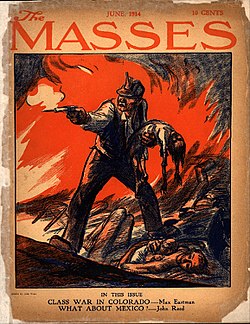| "The Ludlow Massacre" | |
|---|---|
 Contemporary depiction of the Ludlow Massacre | |
| Song by Woody Guthrie | |
| Written | 1944 |
| Genre | Protest song |
| Songwriter(s) | Woody Guthrie |
"Ludlow Massacre" is a song by Woody Guthrie about the Ludlow Massacre, a labor conflict in Ludlow, Colorado, in 1914. [1] A related song is the "1913 Massacre".
Contents
Woody Guthrie wrote:
I made up these like I was there on the spot, the day and the night it happened. This is the best way to make up a song like this. When you read the life work of Mother Ella Reeves Bloor 'We Are Many' you will see this story of the Ludlow Massacre, you will be there, you will live it. Ludlow Massacre was one of the hundred of battles fought to build trade unions. I want to sing a song to show our soldiers that Ludlow Massacres must not ever come back to us to kill 13 children and a pregnant woman, just to force you to work for cheap wages. [2]